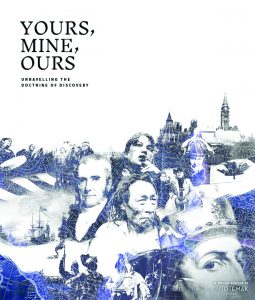Yours, Mine, Ours: Unravelling the Doctrine of Discovery
Cheryl Woelk, Steve Heinrichs, eds.
Mennonite Church Canada
 I do not especially enjoy thinking about the systemic causes of my behaviour. It is not pleasant to dwell on how I live in systems that directly influence how I act. This influence is not usually obvious and often not very good.
I do not especially enjoy thinking about the systemic causes of my behaviour. It is not pleasant to dwell on how I live in systems that directly influence how I act. This influence is not usually obvious and often not very good.
Of course, the hidden forces that direct our lives are not all bad, and our ecclesial traditions offer many examples of systemic influences that produce good fruit. I am grateful to identify as a Mennonite; I try to draw from the rich history of peacemaking found in the lives of so many Anabaptist disciples of Jesus.
I chose, and continue to choose, this identity in the hope of being formed by the body of a local Mennonite Brethren church. But the question I (and Christians of all stripes) am now faced with is what do I do about the parts of this tradition that are not especially Christ-like?
Perhaps the most significant – certainly the most painful – lesson of my adult life as a Christ follower in Canada has been learning about the shameful and ongoing history of relations between churches and Christians and the Indigenous peoples of this land. What makes this lesson especially painful is that, like chattel slavery to the south, our abuse of Indigenous peoples and our abuse of the land is not a freak aberration for which we have no explanation.
Our sinful relations with Indigenous people is the product of implicit and explicit beliefs that are woven into many of our central theological concepts and dogmas. Some of the explicit beliefs have a name like the Doctrine of Discovery or terra nullis (the land belongs to no one, and therefore is free to be taken). Because it is not always possible to see the link between things like theology and everyday behaviour, I feel especially compelled to ask, what should we do about this? How do I do more than just the easy disavowal of beliefs like the doctrine of discovery?
Yours, Mine, Ours: Unravelling the Doctrine of Discovery, edited by Cheryl Woelk and Steve Heinrichs is a creative response to Canada’s Truth and Reconciliation Commission and their calls to action, specifically #49, which calls “all religious denominations and faith groups…to repudiate concepts used to justify European sovereignty over Indigenous lands and peoples….”
Do you want to hear from a wide range of perspectives about the relationship between theological beliefs and our settler history? Are you concerned about how to move forward in healthy reconciliation with the First Peoples of this land? Do you want to be inspired by stories about people who are trying unwind the long and poisonous thread of settler theology? This is a book for you.
This is even a book for those who are unsure that settler theology is a legitimate concern or that Christians have any obligation to respond to the sins of the distant past. This book is not one thing. It is deep and wide, and might just drag you along, a literary riptide that flows against the current of our culture and our past.
I found this book, and its sister volume Wrongs to Rights, to be compelling sources of information, but it is hard to read things that are compelling because to be compelled is to be confronted with the need for change.
In the chapter entitled “Healing from ‘Lies that make us Crazy’: Practices of Restorative Solidarity,” authors Elaine Enns and Ched Myers explain how the destructive influence of the Doctrine of Discovery is not merely a “sin of the past” but continues to shape our relationships with Indigenous peoples. The restorative practices they identify as a response are disciplines that should be familiar and welcome among Anabaptists: learning and listening. But though these practices are familiar, like the imitation of Christ in general, they are much harder to embody than to espouse.
What would it mean for Mennonite Brethren to learn the stories of Indigenous victimization? It would probably mean giving up the comfortable story of Canada as a welcoming country that has bypassed the sins of history. It is hard to give authority to alternative accounts of our nation’s history (especially during celebrations of 150 years of confederation, i.e. colonization), but for the sake of a healthy future for Indigenous peoples, and therefore the whole country, we must be able to hear and learn hard truths.
The MB Confession of Faith (another somewhat hidden influence on our praxis) calls us to resist “the unjust exploitation of the earth and its peoples.” Perhaps this can be a principle that we allow to influence us as we work to be more Christ-like in the formation of our church tradition in the years to come.
[Matt Balcarras currently lives on the traditional lands of the Musqueam and Tsawwassen. He is a neuroscientist, author of Peacemaking: A Community Workbook, and is becoming connected with the people of Cedar Park Church in Ladner, B.C., along with his partner Deanna and their three kids.